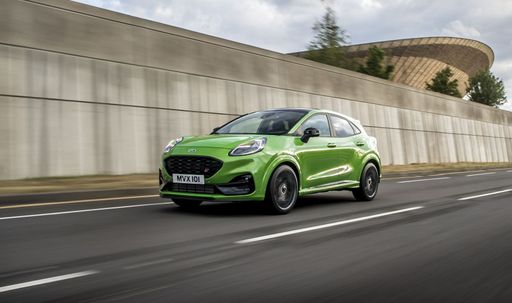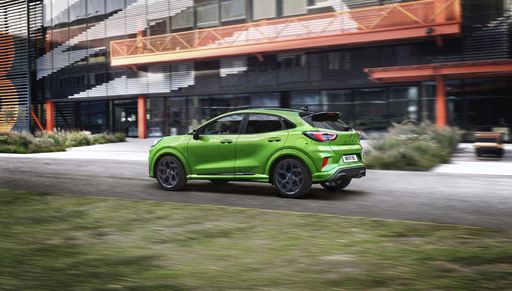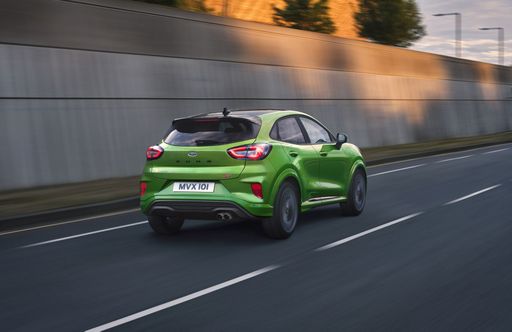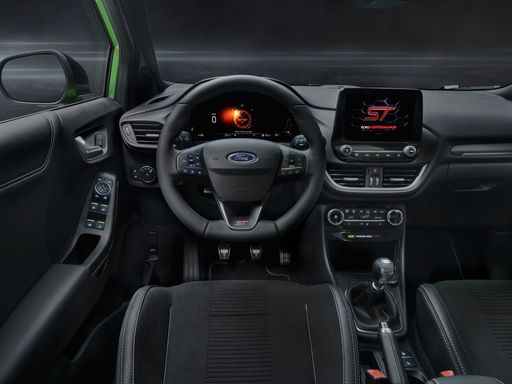Ford Puma vs Porsche Boxster – Differences & prices compared
Compare performance, boot space, consumption and price in one view.
Find out now: which car is the better choice for you – Ford Puma or Porsche Boxster?
The Ford Puma (SUV) comes with a Petrol MHEV or Electric engine and Manuel or Automatic transmission. In comparison, the Porsche Boxster (Roadster) features a Petrol engine with Automatic transmission.
When it comes to boot capacity, the Ford Puma offers 523 L, while the Porsche Boxster provides 122 L – depending on how much space you need. If you’re looking for more power, decide whether the 168 HP of the Ford Puma or the 500 HP of the Porsche Boxster suits your needs better.
In terms of consumption, the values are 13.10 kWh5.40 L per 100 km for the Ford Puma, and 12.70 L for the Porsche Boxster.
Price-wise, the Ford Puma starts at 24800 £, while the Porsche Boxster is available from 136000 £. Compare all the details and find out which model fits your lifestyle best!
Ford Puma
The Ford Puma presents itself as a stylish compact SUV with a distinctive design that combines practicality with a dynamic driving experience. Its sleek lines and sporty aesthetics make it stand out on the road, while the interior offers a comfortable and tech-savvy environment. With an emphasis on efficiency and a smooth drive, the Ford Puma is well-suited for both urban commutes and countryside adventures.
details @ puma.fordpresskits.com
@ puma.fordpresskits.com
 @ puma.fordpresskits.com
@ puma.fordpresskits.com
 @ puma.fordpresskits.com
@ puma.fordpresskits.com
 @ puma.fordpresskits.com
@ puma.fordpresskits.com
Porsche Boxster
The Porsche Boxster epitomizes the essence of a pure, open-top driving experience with its mid-engine roadster design. Known for its agile handling and dynamic performance, the Boxster seamlessly blends luxury with thrilling precision on the road. Its unmistakable styling and superior engineering continue to captivate automotive enthusiasts who crave a visceral connection to the art of driving.
details

|
|
|
|
|
Costs and Consumption |
|
|---|---|
|
Price
24800 - 36300 £
|
Price
136000 £
|
|
Consumption L/100km
5.4 - 6 L
|
Consumption L/100km
12.70 L
|
|
Consumption kWh/100km
13.1 - 13.7 kWh
|
Consumption kWh/100km
-
|
|
Electric Range
364 - 376 km
|
Electric Range
-
|
|
Battery Capacity
43 kWh
|
Battery Capacity
-
|
|
co2
0 - 136 g/km
|
co2
288 g/km
|
|
Fuel tank capacity
42 L
|
Fuel tank capacity
54 L
|
Dimensions and Body |
|
|---|---|
|
Body Type
SUV
|
Body Type
Roadster
|
|
Seats
5
|
Seats
2
|
|
Doors
5
|
Doors
2
|
|
Curb weight
1316 - 1563 kg
|
Curb weight
1485 kg
|
|
Trunk capacity
456 - 523 L
|
Trunk capacity
122 L
|
|
Length
4186 - 4226 mm
|
Length
4418 mm
|
|
Width
1805 mm
|
Width
1822 mm
|
|
Height
1550 - 1555 mm
|
Height
1252 mm
|
|
Payload
367 - 469 kg
|
Payload
270 kg
|
Engine and Performance |
|
|---|---|
|
Engine Type
Petrol MHEV, Electric
|
Engine Type
Petrol
|
|
Transmission
Manuel, Automatic
|
Transmission
Automatic
|
|
Transmission Detail
Manual Gearbox, Dual-Clutch Automatic, Reduction Gearbox
|
Transmission Detail
Dual-Clutch Automatic
|
|
Drive Type
Front-Wheel Drive
|
Drive Type
Rear-Wheel Drive
|
|
Power HP
125 - 168 HP
|
Power HP
500 HP
|
|
Acceleration 0-100km/h
7.4 - 9.8 s
|
Acceleration 0-100km/h
3.40 s
|
|
Max Speed
160 - 210 km/h
|
Max Speed
308 km/h
|
|
Torque
170 - 290 Nm
|
Torque
450 Nm
|
|
Number of Cylinders
3
|
Number of Cylinders
6
|
|
Power kW
92 - 124 kW
|
Power kW
368 kW
|
|
Engine capacity
999 cm3
|
Engine capacity
3996 cm3
|
General |
|
|---|---|
|
Model Year
2024 - 2025
|
Model Year
2023
|
|
CO2 Efficiency Class
D, E, A
|
CO2 Efficiency Class
G
|
|
Brand
Ford
|
Brand
Porsche
|
Ford Puma
A Glimpse into the Ford Puma: Fusing Style with Innovation
The Ford Puma stands as a testament to modern engineering fused with style. This compact SUV is not just about aesthetics but brings to the table an array of technical innovations, topped with the reliability and performance Ford is known for. Let's delve into the technical specifics and innovative features that make the Ford Puma a stellar choice for any car enthusiast.
Powertrains and Performance
The Ford Puma is offered with a range of powertrains designed to deliver optimal performance whilst minimising fuel consumption. At the heart of this compact SUV is the 1.0 EcoBoost Hybrid engine, available in both 125 PS and 155 PS variants. This engine is a marvel of engineering, optimised to deliver power efficiently with a remarkable fuel consumption ranging from 5.4 to 5.7 L/100km for manual versions, and slightly higher for the automated variants.
The top-end 1.5 EcoBoost ST variant takes performance up a notch, providing a robust 200 PS that propels the Puma from 0 to 100 km/h in just 6.7 seconds. This variant is perfect for those who prioritise performance and exhilaration in their driving experience.
Mild-Hybrid Technology
The Puma's mild-hybrid technology plays a significant role in enhancing fuel efficiency and reducing emissions. By utilising a belt-driven integrated starter/generator, the Puma recovers energy usually lost during braking, storing it in a 48-volt lithium-ion battery. This stored energy is then used to assist the engine, providing a boost during acceleration and smoothing out the stop-start technology, ultimately leading to enhanced fuel efficiency.
Design and Comfort
The Ford Puma does not compromise on style and comfort with its ergonomic and stylish design. The SUV is available in multiple trims including the ST-Line, Titanium, and the luxurious Vignale editions, each offering unique aesthetic and technological enhancements. These trim levels provide varied offerings in terms of both exterior styling and interior comfort, ensuring there's a Puma that meets every personal preference.
Inside, the Puma offers a driver-focused cockpit with advanced technological integrations such as the SYNC 3 infotainment system, providing seamless connectivity and intuitive control of the vehicle's numerous technological features.
Safety and Technology
Safety remains paramount, and the Ford Puma is equipped with the latest security and technology features. It boasts the Ford Co-Pilot360 suite which includes adaptive cruise control, pre-collision assist with autonomous emergency braking, and lane-keeping assist, enabling a safer driving experience on both city roads and highways.
Versatility and Practicality
Beyond performance and safety, the Ford Puma shines in its versatility. With a boot capacity of 456 litres, it offers ample space for all sorts of adventures, whether you're heading on a family trip or loading sports equipment. Its innovative MegaBox is an extra storage solution, providing additional space below the boot floor.
The Puma's agile handling, paired with its compact dimensions—spanning a length of 4186 to 4266 mm and a width of 1805 mm—makes it an ideal choice for urban commuting and beyond.
Conclusion
In conclusion, the Ford Puma beautifully blends practical features with cutting-edge technology, offering a package that appeals to both the tech-savvy driver and those seeking comfort and reliability. Its range of innovative features, powerful yet efficient engine options, and a design that is both functional and stylish make it a frontrunner in the compact SUV market.
Whether you're drawn by the efficient mild-hybrid engines or the robust performance of the ST variant, the Ford Puma represents a modern driving experience where innovation meets everyday usability.
Porsche Boxster
The Timeless Appeal of the Porsche Boxster
The Porsche Boxster has long been a beloved member of the Porsche family, revered for its classic design and exhilarating driving experience. Originally introduced in the mid-1990s, the Boxster continues to capture the hearts of automobile enthusiasts and critics alike. The 2023 model stands as a testament to Porsche's dedication to innovation and performance excellence. Let's explore what makes the latest Porsche Boxster a masterpiece in the world of roadsters.
Under the Hood: Engineering Excellence
The 2023 Porsche Boxster features a potent petrol engine designed to deliver thrill and precision on the road. The current version, the Porsche Boxster 718 Spyder RS, offers a rear-wheel drive configuration powered by a robust 4.0-liter engine. This 6-cylinder powerhouse pumps out an impressive 500 horsepower (368 kW), allowing the vehicle to accelerate from 0 to 100 km/h in just 3.4 seconds. With a top speed of 308 km/h, it's built for those who crave speed without compromise.
Innovation Meets Performance
The heart of the Boxster lies in its technological advancements. Equipped with an automatic double-clutch transmission, drivers can expect incredibly smooth gear transitions, enhancing the overall dynamic driving experience. This engineering innovation not only promotes faster acceleration but also improves fuel efficiency, with a consumption rate of 12.7 liters per 100 kilometers.
A Design That Commands Attention
The 2023 Boxster maintains its iconic silhouette with dimensions that echo its roadster legacy. Measuring 4418 mm in length, 1822 mm in width, and 1252 mm in height, it strikes a perfect balance between form and function. With a curb weight of 1485 kg and a trunk capacity of 122 liters, it carries its aesthetic appeal and practicality with poise.
Driving Comfort and Safety
Beyond pure performance lies the Boxster's commitment to the safety and comfort of its occupants. Despite having just two seats, the vehicle encapsulates a cozy environment that prioritizes the driver’s connection with the car. The Porsche Boxster comes equipped with state-of-the-art safety features, ensuring that its high-performance capabilities are not achieved at the expense of security.
Environmental Impact
While performance is a highlight, Porsche has taken steps to address environmental concerns. The Boxster holds a CO2 efficiency class G, emitting 288 g/km of CO2. As always, the brand is committed to reducing its overall environmental footprint while providing cars that deliver unmatched performance.
The Unwavering Allure
The Porsche Boxster's blend of power, style, and precision engineering speaks to those who appreciate the nuances of driving. As Porsche continues to innovate, the Boxster remains a benchmark for what a sports car should be. It's a vehicle that promises to deliver not just speed and performance, but also an incomparable driving experience that is sure to thrill automobile aficionados worldwide.
The prices and data displayed are estimates based on German list prices and may vary by country. This information is not legally binding.
